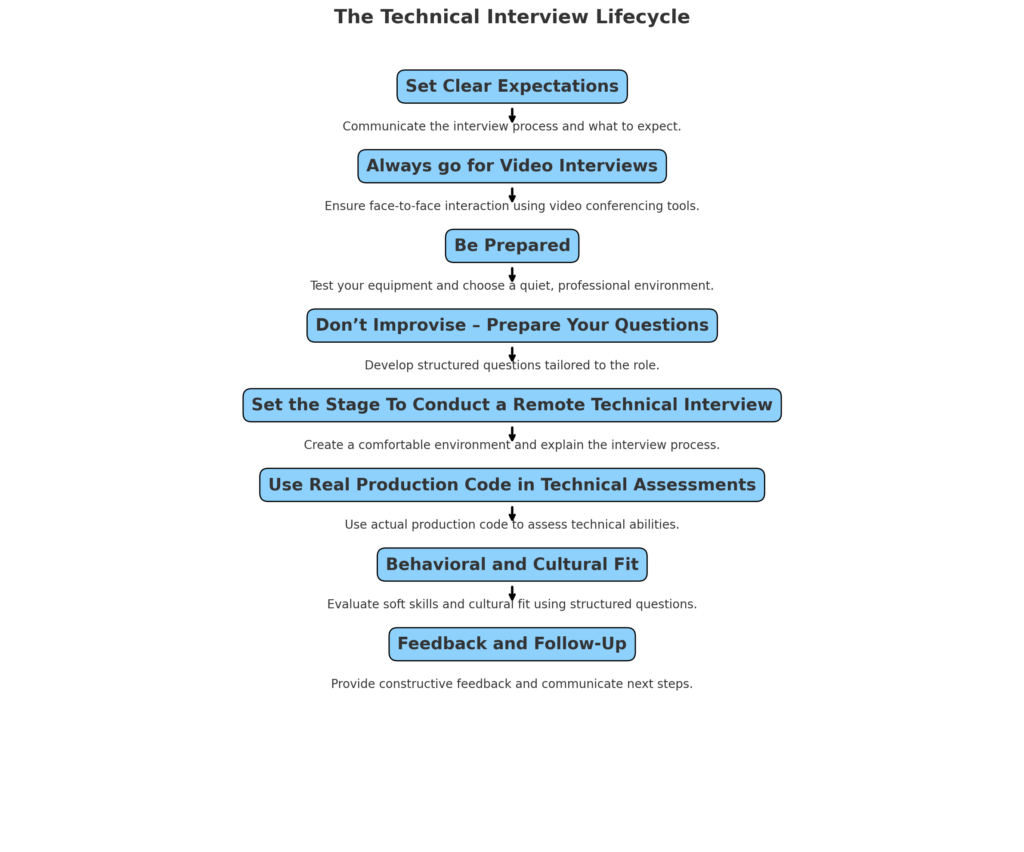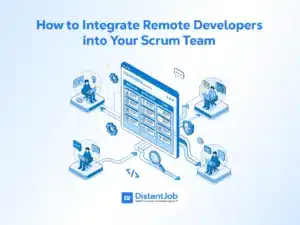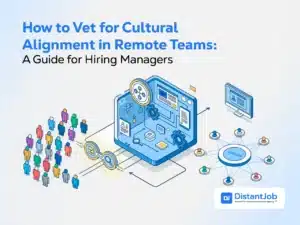How do you conduct a technical interview in a remote setting? Consider the candidate’s technical background, the type of role, and the best communication platform to use to create an effective remote technical interview process. It is important to think about how best to assess a candidate’s technical abilities and soft skills while also providing them with a positive and effective experience.
During our 10 years of experience, we have learned how to evaluate skills like communication abilities, autonomy, and time management, among others. We also know how to structure interview questions to evaluate technical and soft skills. In this article, we’ll share our main tips to help you conduct a technical interview successfully!
8 Effective Steps To Conduct A Technical Interview In A Remote Setting

1. Set Clear Expectations
Remote technical interviews need more prep than onsite interviews. When you wonder how to conduct a technical interview, there are several factors you need to keep in mind to have the right setup.
Time
If a candidate lives in the same country as you, this is not a problem. You clear a space in your schedule, see if they are available, and that’s it. Yet, if they live in another country with a different time zone, you might need to do the interview during hours you usually wouldn’t, for example, in the afternoon. and always mention the GMT to keep everyone in the loop.
Place
Where is the interview taking place? Is it going to be by video call, phone call, or instant message? We recommend having it by video; either Zoom or Google Meet will do the work. But make sure to send the invite to the candidate and let them know about the tools you’re going to be using.
Interviewer
It’s always good for candidates to know who is conducting the interview, whether it’s the HR team or the company owner.
2. Always go for Video Interviews
Mental note for you: Always have the interviews by video call. Talking to someone by email or by phone is very different from seeing them on a camera and seeing their facial expressions. Besides, video calls are the best way to relate with candidates and employees remotely.
According to Software Advice, 60% of hiring managers and recruiters prefer to do remote interviews by video. Many platforms and apps are great tools for conducting remote interviews and connecting better with your candidates.
3. Be Prepared
Whether you are going to make the interview by Zoom or Skype, make sure the platform works well. Test the microphone, and the video, and also make sure that your internet connection is stable. The worst you can do is wait until the last moment to find out your mic isn’t working, or the platform needs updates.
Pro Tip: Always test your video conferencing setup at least 15 minutes before the interview starts.
Location is also something to have in mind. Quiet spaces do make a difference in remote technical interviews. Seek a quiet spot in your house, far away from the playroom (if you have little kids). Or go to a nearby coffee shop with a good internet connection and few people.
4. Don’t Improvise – Prepare Your Questions
You know the type of employee you are seeking, so why prepare the questions? Well, although you might be good at improvising, don’t take this step for granted. The type of questions you make impact how you conduct a technical interview. Question prep is useful, especially when you know what type of employee you want in your team and what kind of answers you want to hear when asking technical questions.
Bonus tip: Go for team interviews as well! It’s useful to have other team members interact with candidates. Post-interview, discuss impressions to ensure alignment on cultural fit.
Recruiting great talent is a process. Don’t try asking a hundred questions about everything at the same time. At DistantJob, even though we headhunt and hire easily, we like separating things a bit. On the one hand, we ask questions to see if a candidate has the technical skills; on the other hand, we also make sure that candidates will be a good fit for the company. And this doesn’t always happen during the same interview.
If you need some inspiration on what skills to look for in a remote employee, our marketing director Luis Magalhaes, has come to the rescue. Check out the video below:
5. Set the Stage To Conduct a Remote Technical Interview
Although we are proud defenders of the video-interview movement, we know it’s never the same to meet the person physically. But, this doesn’t mean that during video interviews, you won’t be able to connect with candidates. This mainly depends on how good you are at conducting technical interviews.
Setting the stage doesn’t mean to bring up candles and put some nice music on. It means to talk as if you were having the interview in the same room. Keep in mind that candidates might be nervous and that not everyone loves cameras, so help them feel comfortable to answer your questions the best way they can. According to Glassdoor, candidates who experience a positive interview environment are up to 70% more likely to accept job offers.
6. Use Real Production Code in Technical Assessments
One highly effective technique for conducting technical interviews is to use a section of your actual production code. Here’s how to implement this approach:
- Take a current piece of your production code and remove a section from a function.
- Ask the candidate to implement the missing feature and run the test.
This method offers several benefits for both the interviewer and the applicant:
- It demonstrates that your company has a well-considered developer process, including a configured development environment on a laptop.
- It shows candidates that you’re not using them for free work, as you’re using existing code.
- It gives applicants insight into your current codebase, documentation, and maintainability.
- It provides a concrete example of “how it should work,” potentially preventing over-engineered solutions.
This approach allows you to assess the candidate’s ability to work with real-world code and adapt to existing codebases. It also gives candidates a genuine taste of the work they’d be doing if hired.
7. Behavioral and Cultural Fit
Behavioral Questions:
Crafting the right questions is crucial for gleaning valuable insights about your candidates.
Frame questions using the Situation, Task, Action, Result (STAR) technique. This helps candidates provide structured responses and gives you insight into their problem-solving process.
Example Question: “Can you walk me through a recent project where you faced a significant technical challenge? What was the situation, what actions did you take, and what was the result?”
Assess Remote Work Readiness: Ask about candidates’ remote work experiences, how they manage their time, and their strategies for staying productive and maintaining boundaries between work and personal life
Soft Skills: Assess communication, adaptability, and how well they might integrate with your team’s culture. Sometimes, a candidate’s potential for growth and ability to collaborate effectively outweigh technical performance.
8. Feedback and Follow-Up:
- Detailed Feedback: Provide candidates with constructive feedback regardless of the outcome. This can help them improve and also leaves a positive impression of your company.
- Next Steps: Clearly communicate the next steps in the hiring process to successful candidates, including timelines and any additional interviews or assessments.
Conclusion
Conducting effective remote technical interviews is a blend of technical assessment and understanding a candidate’s fit within your team. By preparing thoroughly, using the right tools, and focusing on both hard and soft skills, you can identify the best candidates for your remote positions.
If you want to skip the process of recruiting remote developers because you want to focus on other aspects of the business, you don’t have the technical background, or to avoid a bad hire, we want to help you.
Our technical recruiters are here to help you streamline the process of recruiting remote developers and find the perfect fit for your company. We understand the importance of finding the right candidate and promise to provide you with a talented developer within two weeks. Our goal is to provide companies around the world with top-notch tech talent at an affordable price. Let us help you find the right developer for your business today!





